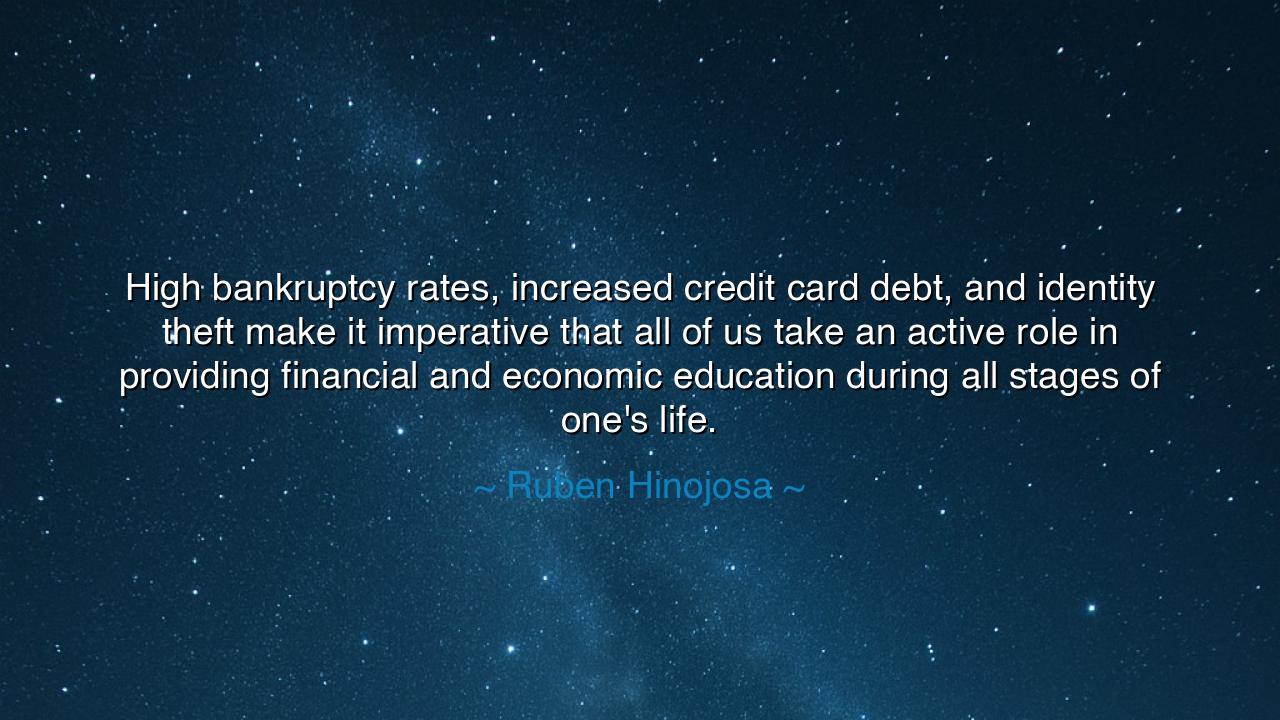
High bankruptcy rates, increased credit card debt, and identity
High bankruptcy rates, increased credit card debt, and identity theft make it imperative that all of us take an active role in providing financial and economic education during all stages of one's life.






The words of Ruben Hinojosa fall upon us like a solemn warning and a call to action: “High bankruptcy rates, increased credit card debt, and identity theft make it imperative that all of us take an active role in providing financial and economic education during all stages of one’s life.” In this saying lies the recognition of a hidden battlefield, one not fought with swords and shields, but with debts, contracts, and the unseen hands of commerce. Hinojosa reminds us that ignorance in matters of finance is as dangerous as ignorance in matters of health or law, for it can enslave the spirit and consume the fruits of labor.
What is bankruptcy but the collapse of dreams, when the walls of debt grow higher than the means to climb them? What is credit card debt but the subtle chain, woven from promises of ease and convenience, that binds families in worry for years? What is identity theft but the violation of trust, where the very name of a person is stolen and used against them? These modern dangers are not trivial inconveniences but storms that can strip away security, dignity, and peace of mind. Hinojosa saw in these dangers the need for education—not once, not briefly, but through every stage of life.
The ancients knew well the peril of debt. In Rome, before reforms were passed, a man who could not pay his creditors might be sold into slavery or cast into prison. Entire lives could be ruined by the careless signing of a bond. The Roman statesman Cato declared that debt was the chain of free men, and that to guard against it was the duty of every citizen. In our age, the prison is no longer made of stone, but of endless payments, mounting interest, and the gnawing fear of insolvency. The lesson is the same: without knowledge, freedom itself is endangered.
Consider the story of the Great Depression of the 1930s. Millions lost not only their savings but their faith in the system of trade and credit. Banks failed, families were uprooted, and hunger spread across the land. In its wake, governments introduced new structures of economic education and regulation, teaching people to save, to invest carefully, and to understand the forces that shaped their lives. Out of tragedy grew the recognition that economic literacy was not a luxury but a necessity, as vital as reading and writing themselves.
Hinojosa’s words carry also a profound moral truth: that education in money must not be confined to the few, but must be the duty of all. For wealth and poverty affect not only individuals, but families, communities, and nations. When one household is drowned in debt, children suffer. When many are misled into financial ruin, entire economies falter. Thus he declares that all of us must take an active role, teaching one another, sharing wisdom, and refusing to let ignorance steal the future of the young or the security of the old.
The lesson for us is clear: do not neglect financial education. Learn not only how to earn, but how to save, how to spend, how to guard against deceit. Teach children early the value of money, the danger of debt, and the discipline of stewardship. Continue learning in adulthood, for the world of finance changes swiftly, and complacency invites disaster. In old age, guard against fraud and guide the younger generation with your experience. Let every stage of life be accompanied by wisdom in economic matters, for in this lies security and freedom.
Therefore, O listener, take these words to heart: economic ignorance is a silent thief, robbing freedom without warning. But financial wisdom is a shield, protecting not only wealth, but peace, dignity, and legacy. Let us heed Hinojosa’s call, and weave financial and economic education into the very fabric of life. For when knowledge is shared, households prosper; when wisdom is passed down, nations endure. And in this way, we secure not only our own future, but the future of generations yet to come.






AAdministratorAdministrator
Welcome, honored guests. Please leave a comment, we will respond soon